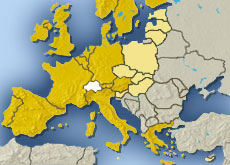Swiss start talks with new EU members

Switzerland has started negotiations with the European Union in Brussels on extending its accord on the free movement of people to include the ten new member countries.
But the talks are being clouded by the threat of a referendum in Switzerland on the changes – which may stop the process altogether.
The free movement accord, which relaxes restrictions governing the employment of EU citizens in Switzerland, is one of seven bilateral agreements between Bern and Brussels.
The other six will be extended automatically to the new members when they join on May 1, 2004, but the labour accord needs to be negotiated with each new member state.
Unlike other countries, in Switzerland the results of the negotiations could be subject to a nationwide referendum.
Trade unions have already warned they would force a nationwide vote if the government fails to prevent wage dumping and a deterioration in work conditions after the agreement.
And if the people reject the accord, all of the seven bilateral agreements will be revoked, due to a special “guillotine clause” which links them together.
Patience
It was for this reason that Dieter Grossen, head of the Swiss delegation to Brussels, told the European Commission that an agreement wouldn’t enter into force before 2005.
“One has to be patient,” said the assistant director of the Federal Office of Immigration.
For its part, the commission wants to extend the agreement to the ten new member countries, mostly from eastern Europe, as soon as possible before they join on May 1, 2004 – a suggestion which the Swiss have dismissed as “unrealistic”.
And the commission wants Switzerland to make no distinction between the existing 15 EU members and the ten new countries.
Switzerland says it is in favour of opening up its labour market to the ten new members. The Swiss justice minister, Ruth Metzler, has said it would be a good opportunity for the country and its economy.
The agreement would open up a potential market of almost 450 million Europeans and lead to a potential economic growth of up to 0.5 per cent or SFr1-2 billion a year.
Stages
But Switzerland says it wants to open up its labour market in stages, using quotas and transition periods.
It wants to base the new agreement on the existing one, in which the market is opened up progressively until 2014.
The country points out that the new members are in a different position to the original 15 EU members at the time of negotiating the first bilateral agreements.
Work permits were already issued more freely to workers from the EU at that time, whereas the ten new countries were lumped with the rest of the world in terms of permit quotas. Work permits are still issued sparingly.
The delegations will meet again on September 10 and both sides hope to have concluded the accord by the end of the year.
swissinfo, Barbara Speziali in Brussels
The Swiss voted in favour of the first set of bilateral agreements by 67 per cent in May 2000.
The agreements governing labour, trade and transport came into force in June 2002.
Switzerland is negotiating a second round of ten bilateral accords including taxation of savings, prevention of fraud and education and professional training.

In compliance with the JTI standards
More: SWI swissinfo.ch certified by the Journalism Trust Initiative











You can find an overview of ongoing debates with our journalists here . Please join us!
If you want to start a conversation about a topic raised in this article or want to report factual errors, email us at english@swissinfo.ch.